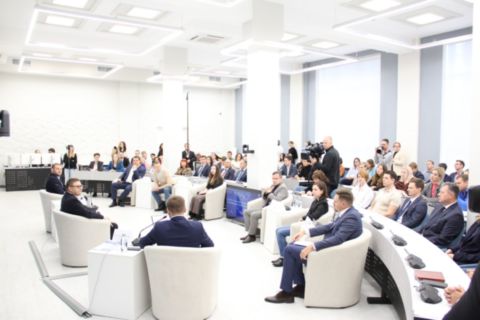On October 15th, an extended meeting of the Council of Young Scientists and Specialists of the Chelyabinsk Region was held in the conference room of the University Council of South Ural State University. The event was chaired by the Governor of the Chelyabinsk Region Alexey Texler and the Chairman of the Coordination Council for Youth Affairs in Science and Education of the Russian Federation Presidential Council for Science and Education, an employee of the Kurchatov Institute Nikita Marchenkov. The SUSU Rector Alexander Wagner moderated the meeting.
"A region cannot develop without developing the scientific and educational component," Governor Alexey Texler said in his opening speech. "Attention to science and young scientists is fundamental. We are facing an era of intensive technological development, when the leaders, including those with political influence, will be those countries that can achieve scientific success. This is a challenge for Russia and a matter of national sovereignty."
Young scientists from SUSU Anna Paterova, Ruslan Peshkov, Oleg Bolshakov spoke about their scientific and technical achievements. Chairman of the Council of Young Scientists and Specialists of the Chelyabinsk Region Nikita Savosteyenko reported on public initiatives to support science: from "scientific" playgrounds and excursion routes to organizing interaction between postgraduate students of universities and specialists from enterprises in the South Ural region. Anna Solina, a young scientist from the Chelyabinsk State Institute of Culture and Arts, touched on the topic of popularizing science. Viktor Freidenberg spoke about the advantages of the Mendeleev card, which allows young scientists to attend cultural events at a discount.
"I found this meeting very useful," admitted Anna Paterova, Senior Research Fellow at SUSU. "I learned about the initiatives of other young scientists in the region. It is gratifying that such prospects are opening up in Chelyabinsk, and many of them are based at SUSU. I learned that there are many social programs for young people, and it was interesting to hear about the housing program."
At the end of the meeting, government representatives answered questions asked by young scientists from Chelyabinsk.
"We have worked constructively," Nikita Marchenkov summed up the event. "The experience of such meetings in different regions is very valuable: in Oryol, Bryansk, Primorsky Krai, and of course in the Chelyabinsk Region, each region is unique. I am leaving inspired by new ideas from the guys, and the guys, I hope, got answers to their questions about how scientific and technical policy is developing today, both at the state and regional levels. It is very valuable that the head of the Chelyabinsk Region Alexey Texler took part in today's event."
After the event, the guests went on an excursion to the university’s research laboratories and met the scientific teams. Among the first ones was the team of the Nanotechnology Research and Education Centre with the majority of young researchers (85% of the staff being under 40). Over the first half of 2024, the Centre’s researchers defended four dissertations, and three more are planned for December.
“The SUSU Nanotechnology Research and Education Centre focuses on studying certain characteristics of materials, in the context of both our own tasks and the task of our industrial partners,” said the Centre Director Viacheslav Avdin. “First and foremost, this concerns research in metals, alloys, and inorganic and composite materials. Based on this, we have selected relevant equipment: heat-treatment and thermal-analysis equipment, and gas and liquid chromatography equipment. We are also solving several issues on re-engineering when foreign suppliers refuse to deliver some samples that we need for production. In our laboratory, we can determine what kind of substances these are and whether we could produce them ourselves.”
As words of farewell, the Chairman of the Presidential Coordination Council Nikita Marchenkov wished the young scientists of SUSU to preserve their ambitions with regards to setting of their goals and to hold responsibility, since the future of our country in the nearest decades depends namely on young scientists.




